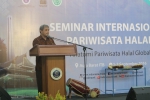Indonesia’s Opportunities in Running Halal Business
By Adi Permana
Editor Adi Permana

BANDUNG, itb.ac.id – Indonesia as the largest Muslim population country in the world has massive potential for halal industries. However, the focus is still on the products and not expanded on other aspects such as the running processes in a halal industry. This problem becomes the concern of Yuliani Dwi Lestari, Ph.D., a lecturer in School of Business and Management (SBM) of Institut Teknologi Bandung.
Two major parts of halal industry are the products and the supply chain. Yuliani explained that product base has run well in Indonesia, marked by the increase in industries applying and passed halal certifications for their products. However, the supply chain—related to logistic process (transportation, warehouses, and retailing) of a halal industry—still requires clear standard reference and campaign so that logistic provider and business are aware and active to use halal logistic.
“Strengthening ‘halal’ value chain should be done from the input materials in the factory to the output and logistic process which is managed by those factories,” she said.
She explained that three main perspectives that become the main bases when talking about halal industry are regulation, market, and industry preparedness. When Global Halal Based Business Development runs, required regulations should be prepared by regulators to regulate and support the halal industries.
Halal industries today engage not only in foods sector. Market demand has expanded onto other products such as cosmetics, medicines, fashion, travel, energy, and other things. According to her, today’s consumer behavior has also changed and it would be a challenge whether non-Muslims will consume halal products despite its higher cost.
“In several cases, there are many benefits obtained [from using halal products]. For example, according to a discussion with non-Muslims from various countries in Asia and Europe, they are interested in halal products because it gives better safety, health and quality because the regulation is more strict,” she said.
However, Yuliani said, a campaign is required to promote the halal industry market in non-Muslim majority areas. The last perspective is about industry preparedness. Making sure the industries to receive profit from the implementation of halal industry, the design and measurement for profit and added value, and cooperation between industry, regulators and market.
Indonesia as the largest Muslim population country in the world definitely has great opportunity to run halal industries. However, several problems will come up. According to Yuliani, those challenges are cooperation between universities, regulators, and industries that need to be increased to facilitate the development. In addition, there needs to be synergy between various sectors in Indonesia as a unity. Hopefully in the future halal industry will run well in every sector of the country and we can be a global pioneer of this Global Halal Based Business Development,” she added.
Reporter: Christopher Wijaya (Pharmaceutical Sciences and Technology 2016)

.jpg)
.jpg)
.jpg)
.jpg)
.jpg)


